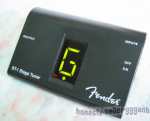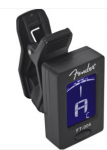I saw this at NAMM and a got an in person demo, and thought it was pretty cool for what it is. Pricey, I agree, but cool none the less.
Unlike a chromatic tuner though, this allows you to just to tune to any pitch regardless of a specific note,
or you have the option of tuning to a note. The average guitar tuner really doesn't allow for tuning to anything other than specific notes.
And unlike tensions watches, drum dials, and other items that measure criteria that should give you drum in tune, but don't always, this measures the sound of the drum itself, letting you know it's either in tune, or not. And while other tuning devices work on toms, I find most of them are useless on snare drums and bass drums, while this one works on snare drums easily enough, and should translate to a bass drum well.
With the "tuner" highlighted in this thread, and this is the engineer in me speaking, although my degree is not mechanical engineering, with uncontrolled outside variables, measuring devices can only be as accurate as those variables. The variables that I'm referring to is both the pressure needed on the head to prevent harmonics, the pressure of the stick hitting the head and also where the "tuner" is specifically placed on the hoop.
The manufacturer already stated that the "tuner" cannot read the note unless the harmonics of the drum were squelched. They did this with placing their hand on the middle of the drum head. This alone will alter the exact pitch of the head and depending on the pressure of the hand this could vary greatly and not be the same from tension rod to tension rod throughout the tuning process.
How hard the head is hit can vary the accuracy of such a device.
This is all very true, and I won't disagree. However, in tuning by ear, all these same variables exist. Taping around the edge of the head by hand is going to produce a variety of different pressures, which in theory are measurable, but in reality, we don't notice.
As for tune by ear, yes, that is the goal for any drummer. But how many times are we loading into a venue, and another band is soundchecking, or the DJ is testing out the PA, or your guitar player is testing his amp, or otherwise it's just too noisy to hear the difference from lug to lug? In the middle of NAMM, it's insanely noisy, yet this was (as far as I could tell) still able to get a measurement.
All decent guitar players can tune by ear, but all professional guitar players and professional roadies still have a tuner so that surrounding noise is not a factor. And that is where I see an interesting parallel.



